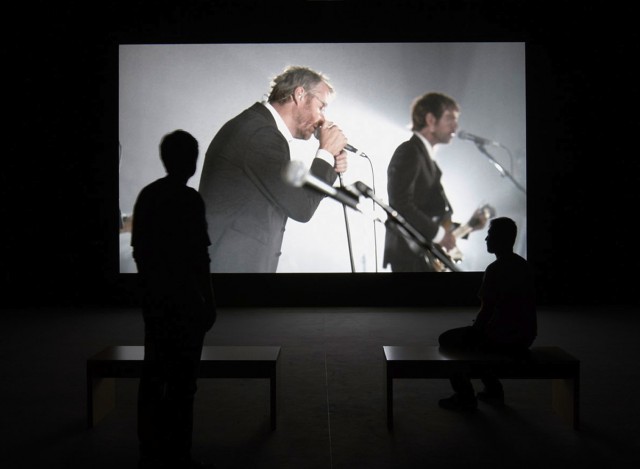
Ragnar Kjartansson’s video installation at Luhring Augustine’s space in Bushwick is one of the best gallery shows in New York. (Click on my installation shot to see a long, exclusive clip from the video itself.) The piece is titled A Lot of Sorrow, and the premise is simple: In May 2013, before a live audience at the MoMA PS1 art center, Kjartansson filmed the classic indie-rock band the National as they performed “Sorrow”, one of their hits, again and again and again, without interruption, for six hours straight. The high-end concert video that resulted is what’s on view at Luhring Augustine, and it is totally captivating for any number of reasons, on any number of levels.
I have to admit that some of my pleasure in watching was sadistic: What dweeb art critic wouldn’t get a thrill from watching a bunch of gorgeous hipsters being forced to enact and reenact their hipsterdom to the point of exhaustion? There’s also plenty of masochism involved for the viewer: How many times can even the most dedicated artsie, or hard-bitten National fan, watch the same song being performed without wanting to run screaming from the gallery?
Humor’s another emotion triggered by the video, as with most examples of absurd endurance art. I’m thinking, for instance, of the comic absurdity of Warhol’s Empire–the obvious precedent for Kjartansson’s piece–which saw Andy shooting the same static skyscraper for a good part of an evening and night, and then us poor saps in the audience watching the slowed-down footage for even longer.
The new video also yields dividends on a more fine-grained, aesthetic level. There’s a sense in which the song itself profits from its hundred or so repetitions, since the musicians have to do everything they can to make it new each time, if only to stave off their own terminal boredom. “Sorrow”, a truly classic three-minute pop song that was designed to undergo at most six or nine minutes of sustained contemplation, goes under the microscope in this version, and comes out intact. Getting a band to perform the same song this many times is like strapping an artist, or viewer, into a chair and demanding that they contemplate the same single work for most of a day–an experience that might be seen as either torture or treat, depending on the artist, the viewer, the work and the day. (Jonas Mekas talks about having strapped Warhol down for a screening of Empire, and about how Warhol slipped his bonds.) Or maybe the sheer repetition of the song forces all involved into the role of the ideal art critic, compelled to parse and reparse the experience on offer, and to endlessly renew their thoughts on it. “I don’t want to get over you,” says one verse in the song, ad infinitum–but maybe we’re the ones who want to get over it.
As the song gets endlessly re-played, it undergoes something you might call “auto-deconstruction”: the musical and poetic and romantic tropes that are central to any mopey rock song, and which are normally part of its underlying and ignored scaffolding, start becoming its central subject matter. Repetition turns a genre’s clichés into a central subject–of the band’s song, and of their concert, and of Kjartansson’s work of art. In fact, the authorship of the piece is so perfectly split between Kjartansson and the National that we’re never quite sure whose art and artfulness we’re paying attention to as we watch. Art insiders will wonder if the band ought to count as collaborator on the piece or as mere art supply; the more musically inclined will wonder if Kjartansson should count as fellow artist, promoter, or merely documenter of their favorite band’s ultimate performance. Maybe Kjartansson is merely helping the band members achieve a live reenactment of that moment when any moody teen locks the bedroom door and makes a favorite song play on endless repeat. (My infinite listen came one day when I was 14; the song, to my shame, was “I Will Survive”.) The narcissism of teenage angst, at the heart of the mope-rock tradition, is here made to watch itself playing out over hours–a watching that of course can only count as the narcissist’s greatest pleasure. (The National’s members, to their credit, never drop their iconic rock-star anomie; they never fall into facile irony, as they could so easily have done, if only out of bored exhaustion. Any one repeat of their song could stand on its own as a classic performance, even if the early ones have a boy-band freshness while the last ones are all about an old rocker’s sweat and exhaustion.)
Or it could be that Kjartansson’s piece echoes and reenacts a different moment of repetition. The looping video has become a staple of contemporary art–one of its greatest innovations and also one of its worst and most painful clichés. In both the performance at PS1 and then the taped viewing at Luhring Augustine, Kjartansson makes that looping go live, showing how, in this case at least, life really does copy art. (Images courtesy the artists and Luhring Augustine, New York;©Ragnar Kjartansson and the National)
For a full survey of past Daily Pics visit blakegopnik.com/archive.